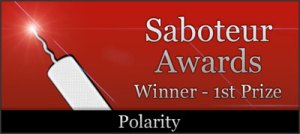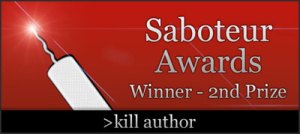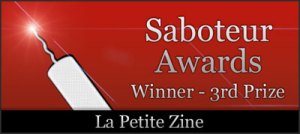– Reviewed by Jared Randall –
Grown tired of your summer reading list? Need a break after that last 600-page novel? Having trouble keeping your comatose left eye in line with your hay-fevered right? (Maybe that last one is just me…?)
Then give >kill author a try. I guarantee it won’t bore you (unless you happen to be my brother-in-law). Currently up at http://killauthor.com, the eighth issue of the literary journal for the mostly alive is “…made for summer reading. […] our own equivalent of the holiday getaway doorstop.”
Now you’re probably wondering, what is > kill author? (Hereafter, >ka.) Simply put, it’s an online journal that takes its name from one of many well-known Roland Barthes quotes—“The birth of the reader must be at the cost of the death of the author.”—and the anonymous editor(s) dedicate(s) each issue to a particular dead author (Issue One to old Roland himself, Issue Eight to Vladimir Nabokov who, incidentally, died the same year that I was born, in 1977).
In actual working out, the “death of the author” has become for >ka “the death of the editor”—the “editors” have intentionally kept themselves anonymous. He/she/it/they explain that this anonymity forces writers to read and think about what constitutes authentic >ka content without the distraction of guessing the tastes and reputation of a particular editor.
The question of editor as author, however, is a task for another day. What you really want is a rundown of the most interesting bits of electronic literary bravura that Issue Eight of >ka has to offer. In that case, read on!
“Flight: SFO to LAX,” by Andrew Roe.
Nutshell: Touchable hair, the kind of hair to turn anyone into a five-year-old kid again. The kind of hair a Steinbeck uses to lure a Lenny to his inevitable end…
Quote: “The challenge: to remember the woman, the hair, the possibilities you felt. But you know you won’t. It doesn’t work that way, and it’s not like this hasn’t happened before.”
Verdict: What an excellent way to open an issue!
“Dogs and cats are ugly,” by Cameron Pierce
Nutshell: Raw physicality engendered by mere words. Will make you think twice before nibbling on your lover’s ear…
Quote: “[…] and we’ll go down to the doughnut shop/ and we’ll get married in the doughnut shop/ and please remember I am just a skeleton and some canned food and so are you.”
Verdict: Not for your grandmother! (Nor mine, for that matter.)
“The Labyrinth,” by Cezarija Abartis
Nutshell: Yes, THAT labyrinth, but this time the Minotaur is something less fierce, more pitiable, what we see in the mirror (or maybe that’s just me…)
Quote: “…he moaned and said, ‘Mud.’ She was sure he said it. Her deepest prayers had been answered. This redeemed everything—all the pain, the hope, the curses. This would make her life normal, give her a normal future, give him a normal life.”
Verdict: Perhaps not everyone will find the final turn convincing.
“Four Turns,” by Daniel Carter
Nutshell: Four prose “stanzas,” the last sentence of each leading into the first sentence of the next—thus, “Four Turns”…
Quote: “O, the cowl o’er my head, the rough black sack, the bag over the moon, I jumped off the castle, the moat, the monster, the golden man down there[…]”
Verdict: Don’t be fooled by this one: it gets more interesting each time you read it.
“Attention,” by Daniel Romo
Nutshell: A FAUX News corrective? Yeah, maybe, or maybe more than…
Quote: “The patriotic fibers bleed into your fingertips causing everything you touch to be left with imprints of stars and stripes. The paper towel dispenser in the bathroom at Walmart. The salt and pepper shakers at the Mexican restaurant. Your lover’s breasts.”
Verdict: Accessible, meaningful, sharp-edged, a prose poem as prose poems should be. If you can’t stand this, well, leave left and right behind, ascend to the airy top of the political divide, and cozy up to an honest voice.
“The Anatomy of the Novel, or Steve,” by David Laskowski
Nutshell: If you’ve been paying any attention at all you’ve probably realized that there is an ongoing discussion/debate about the supposed “death of the novel.” Mr. Laskowski enters his own rather humorous take…
Quote: “What is interesting is that the novel’s suit against Steve comes at a time when many question the role of the novel in everyday life, a state that wishes to succeed, according to Dr. Myers Default, author of It’s You, Not Me, because of ‘the federal government’s intrusion into its knickers.’”
Verdict: Read and then mark off the rest of your summer to-do list. It’s done! What else could there be?
“Italo Calvino People,” by Elaine Chiew
Nutshell: I knew I was going to like this one from the title. Can anything with Calvino in the title be less than interesting? A speculative glimpse at a future world, it also contains a reference to “Godot-like plays”…
Quote: “They were Italo Calvino babies, so called not because they were the embodiment of magical realism, but because they were an experiment—in the spirit of Italo Calvino experimentation—riddled with hopeful optimism camouflaging a deep misanthropic belief that humans were flawed and needed to be perfected. And because they could read Italo Calvino at five.”
Verdict: I’m pretty sure I’m biased for this one, so go ahead: read and let me have it!
“You Enjoy Myself,” by Frank Hinton
Nutshell: You wake up and find yourself all too close to the body of an apparently middle-aged single Asian (Korean?) man named Yem who eats only frozen dinners and has somehow managed to convince people he should be an elementary school teacher. Yes, and it gets better…
Quote: “He never stops at 4 minutes in to mix the potatoes or stir the gravy. He’s grown used to eating the potatoes cold in the middle.”
Verdict: To be honest, this is a sadder story than I’ve portrayed it. Not for the queasy reader, but—poor Yem!—many readers will find this a guilty pleasure.
“This Is What I Do,” by Jennifer Spiegel
Nutshell: First-person fiction with a (dated?) World Trade Center reference…
Quote: “I felt like Lily Bart in The House of Mirth, not like myself one lousy bit.”
Verdict: This is the whole package. It’s an excellent piece of fiction in a journal that features excellent fiction.
“There Was Nothing We Could Do,” by Lauren Becker
Nutshell: Behind the scenes of tattoo parlor romance…
Quote: “We bit and smacked and punched and sliced and scraped and burned night but it still kept coming and we kept leaving and coming back. Nobody else gave and took as deliberately as we. We were gracious in keeping track.”
Verdict: Definitely on the bondage side of summer love stories, but with a deep truth to tell…
“The Final Neural Firings of The Eternal Starlet (Takes 1-3)” and “I Will Make an Exquisite Corpse,” by Matt Mullins
Nutshell: The same words lineated three different ways—always an interesting exercise!—and Mr. Mullin’s stab at the surrealist “Exquisite Corpse” exercise…
Quote: No quote… [What, the titles aren’t enough?!]
Verdict: A great reminder that, yes, lineation matters in poetry. Not to be missed!
“The Charge That Struck Us,” by Melissa Lee-Houghton
Nutshell: A fiction story in which I sensed some Edgar Lee Masters Spoon River Anthology influence…
Quote: “Dean did not wish his wife were dead in real life, but every time she so much as sneezed he had the overwhelming urge to smack her on the back of the head with a spade[…]”
Verdict: This refreshing piece steps back from the typical first-person/close third-person narrative. Worth a look!
“The Sadder of Two Places,” by Mitch James
Nutshell: An old lady remembers sexuality after hearing the neighbor girl and her boyfriend late one night…
Quote: “They both figured that her closet and dresser drawers were filled with light, lacey things, with bright colors, things made seamlessly by an artist on a sewing machine. […] They were right.”
Verdict: This is one intense story, however you cut it.
“Featherbedding,” by Rae Bryant
Nutshell: Who needs food when they have love? Short and sweetly erotic without going over the top…
Quote: “He digs a trench for her, forms a mote around her body, rips mattress and blanket and sheets and feather pillows to better pad the nest. He says: we can wait out the winter here in feathers and mattress springs.”
Verdict: You may or may not find you like this one, but it’s too short to pass up…
“The Pueblo Is In My Name,” Raymond Farr
Nutshell: What a rant! What an all-out-perfect-for-your-end-of-summer rant!
Quote: “Back then it was 1977/ and the tree I speak of/ was a grapefruit tree and/ the silence of just before/ dawn was a squirrel or/ white tail deer paralyzed/ in yr head lights[…]”
Verdict: Read it out loud!
“Cat’s Ice” and other poems, by R L Swihart
Nutshell: This is poetry in what you might call the “grand tradition”…
Quote: “Now a smithy is on one knee hammering chaos into cosmos[…]”
Verdict: Let’s face it, poetry isn’t on everyone’s menu, but you’ll like this if you let yourself.
“We Were Listening For The Shattering,” by Ryder Collins
Nutshell: In a matter of a few sentences you’ll feel you’re in Stephen King’s The Stand…
Quote: “Mama said, They’re not called package stores in every state.”
Verdict: Gives you that apocalyptic feel in such a short space that it’s worth a look.
Jared Randall’s debut book of poetry, Apocryphal Road Code, is due out from Salt Publishing in December 2010. He writes the occasional blog at http://wanderingstiff.com/mainstem.



